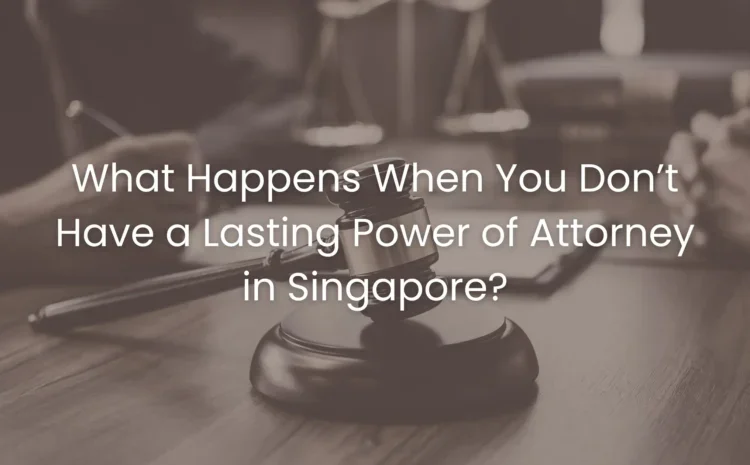What Happens When You Don’t Have a Lasting Power of Attorney in Singapore?
A Lasting Power of Attorney (LPA) is a vital legal document that allows you to appoint a trusted person, known as a donee, to make decisions on your behalf should you lose mental capacity. While many people recognize the importance of an LPA, others may delay or overlook its creation, often resulting in significant legal and financial complications for themselves and their loved ones. In this article, we explore what happens when you don’t have a Lasting Power of Attorney in Singapore, the challenges it presents, and why creating one is crucial for your future.
What Happens When You Don’t Have a Lasting Power of Attorney?
1. Your Family May Face Legal Hurdles
Without an LPA, your family members will not have the authority to make decisions on your behalf if you lose mental capacity. Instead, they must apply to the Family Justice Courts to be appointed as your deputy under the Mental Capacity Act. This process can be time-consuming and emotionally draining.
Challenges of Court-Appointed Deputyship:
Lengthy Application Process: Deputyship applications often take months to process, delaying critical decisions regarding your welfare or finances.
High Costs: The legal fees for deputyship applications can be significant, adding financial strain to your family during an already difficult time.
Restricted Authority: Deputies must act within the limits set by the court, which may not fully align with your preferences.
By contrast, an LPA allows you to appoint someone you trust to make decisions for you, eliminating the need for court intervention.
2. Financial Management Can Be Disrupted
Without an LPA, your loved ones will face challenges accessing and managing your financial accounts. This can lead to missed bill payments, lapses in insurance coverage, and even potential loss of property.
Potential Financial Implications:
Frozen Assets: Your bank accounts, investments, and other financial assets may remain inaccessible until a court-appointed deputy is in place.
Increased Costs: The lack of timely decision-making can result in penalties or financial losses.
Risk of Financial Mismanagement: Without a designated donee, there’s a risk that family members may disagree on financial decisions, leading to disputes.
Creating a Lasting Power of Attorney ensures that your financial affairs are managed efficiently and according to your preferences, preventing unnecessary disruptions.
3. Your Personal Welfare Decisions May Be Delayed
In addition to financial matters, an LPA empowers your donee to make decisions about your personal welfare, including healthcare and living arrangements. Without an LPA, family members may struggle to agree on these critical decisions, causing delays that could impact your well-being.
Key Risks Without an LPA:
Medical Treatment Delays: In the absence of a clear decision-maker, healthcare providers may hesitate to proceed with treatments.
Living Arrangement Disputes: Family disagreements over where you should live—such as remaining at home or moving into a care facility—can lead to further delays and emotional strain.
With an LPA in place, your appointed donee can act promptly to ensure your personal welfare is prioritized.
4. Increased Emotional and Financial Burden on Family Members
The absence of an LPA places a significant emotional and financial burden on your family. They may need to navigate complex legal processes, resolve disputes, and bear additional costs—all while managing the emotional stress of seeing a loved one lose mental capacity.
How an LPA Reduces the Burden:
Streamlined Decision-Making: An LPA simplifies the process, enabling your donee to act quickly and confidently.
Clarity and Certainty: With your wishes clearly outlined, family members can avoid conflicts and focus on supporting one another.
Cost Savings: By eliminating the need for court-appointed deputyship, an LPA reduces the financial strain on your loved ones.
5. Your Wishes May Not Be Respected
Perhaps the most significant risk of not having an LPA is that your wishes regarding your personal welfare and financial matters may not be honored. Without a designated donee, decisions may be made by the court or other parties who may not fully understand your preferences.
Why an LPA Matters:
Control Over Decisions: An LPA gives you control over who makes decisions on your behalf and ensures your preferences are respected.
Tailored to Your Needs: You can specify instructions and restrictions in your LPA, ensuring that decisions align with your values and goals.
Don’t Leave Your Future to Chance
The absence of a Lasting Power of Attorney or LPA in Singapore can lead to significant legal, financial, and emotional challenges for you and your loved ones. By creating an LPA, you ensure that your personal welfare and financial affairs are managed by someone you trust, providing peace of mind and protecting your interests.
At YY Lee & Associates LLC, we are experienced estate planning lawyers helping individuals create comprehensive estate plans, including Lasting Powers of Attorney. Contact us at 8780-2499 to take the first step toward safeguarding your future and ensuring your wishes are honored.

